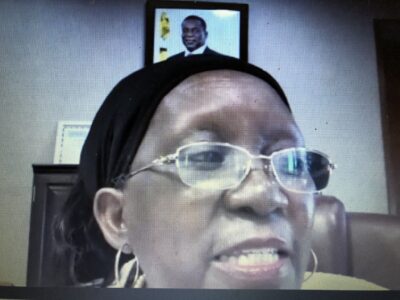“Women will come in their thousands and millions but will have no face. When the moment of truth comes but they will have no voice. To have a voice is power. It allows one not only to put ideas on the table, but to influence decisions, policy, and the shaping of your country,” Farai Mpofu, Head of Investor Education Securities Commission of Zimbabwe (SECZIM), quoted Mrs Graca Machel.
Ms Mpofu shared these powerful opening remarks during a recent New Faces New Voices Zimbabwe webinar on 16th June 2022. The webinar, which was themed Women Leading in The Financial Sector -Role Models and Inspirational Leaders, provided a platform to share findings of the Women in Finance Leadership Survey, Zimbabwe 2021. It also gave women leaders a chance to inspire other women to be leaders in the financial sector and pioneering roles in addressing gender disparities -making a difference as women in finance.

Speakers at the Leadership series NFNV Zimbabwe.
Dr Lucia Mandengenda, the Board Chairperson NFNV Zimbabwe Chapter, gave the opening remarks, giving a background of NFNV Zimbabwe as a Pan African network of Women in Finance under the Trust. She highlighted several of NFNV’s specific objectives, including increasing women’s access to finance and financial services, building the capacity and skills of women to access finance as consumers and as entrepreneurs and invariably growing the visibility and influence of women’s leadership in the financial sector. NFNV is both a convener facilitator and an advocate for financial inclusion, collaborating with all stakeholders to address demand and supply issues.
The NFNV 2021 Women in Finance Leadership Survey showed that few women occupy critical decision-making positions on boards and C-Suite. 8.3% are at director level, and although 11.1% of the respondents were chief executive officers, only 2.8% were board members. Most of the women who responded, 34% are in middle management. This reflects a lower representation of women’s voices and views at strategic and decision-making levels. The Global Women’s Leadership average is 24%, which shows that Zimbabwe’s financial sector lags behind. (Women in Finance Leadership Survey Nov 2021-Feb 2022).

Dr Jasmin Chipiwa shares her journey to becoming a Deputy Governor at the Reserve Bank of Zimbabwe.
The panellists were Dr Jesimen T. Chipika, Deputy Governor, Reserve Bank of Zimbabwe, Mrs Priscilla Munyeza – Managing Director, AFC Land and Development Bank and Mrs Pamela Muzenda – Board Member, Small & Medium Enterprises Development Corporation. Dr Mandengenda then shared some of the critical lessons and leadership insights. These included having a leadership compass and leadership style, acknowledgement of predecessors, women that have led and paved the way, leading with conviction, goal setting, passion and focused vision setting. All reiterated that to enhance women’s financial inclusion, it is essential to know and understand women across the economic and social spectrum and have a calling to serve. In addition, the leaders must have personal branding, value systems, vitality, self-articulation, humility, and balanced life.
Other discussions revealed that women’s organizations’ implored women in finance leadership to support and partner with them in advocacy and awareness campaigns for women’s financial inclusion, especially for marginalized women. In addition, stakeholders from the financial sector acknowledged the need to collaborate and offer financial literacy training to communities as part of CSR initiatives as a collective than going it alone.
In the closing segment, Dr Mandengenda made a specific call to action urging “for women in their spheres of influence, at different levels women in finance leadership to play a role in advancing, advocating and championing women’s financial inclusion.” She also launched the first part of the 2022 edition of its Women in Finance Leadership booklet with profiles of women leaders in the financial sector. This edition also features Dr Chipika and Dr Dhliwayo as current and former Deputy Governors of the Reserve Bank of Zimbabwe. They represent the highest position women have held in the financial sector.
The vote of thanks was delivered by Dr Hesphina Rukato, Chairperson of the Network of African Business Women in Zimbabwe. Moving forward, NFNV continues to convene roundtables and webinars to spearhead an inclusive agenda with both men and women as champions. In addition, it will be rolling out financial literacy through its current partnerships and looks forward to partnering with more financial institutions.
Compiled by Nonhlanhla Ngwenya (WIMN Communications Coordinator Zimbabwe).










 The Trust supports and mobilises civil society networks on issues of ending child marriage, ending violence against children, ending female genital mutilation and promoting children’s rights, to carry out advocacy and action across Africa. Special focus is placed on Malawi, Mozambique, Tanzania and Zambia where child marriage continues to be a problem largely driven by poverty, gender inequality, harmful traditional practices, conflict, low levels of literacy, limited opportunities for girls and weak or non-existent protective and preventive legal frameworks.
The Trust supports and mobilises civil society networks on issues of ending child marriage, ending violence against children, ending female genital mutilation and promoting children’s rights, to carry out advocacy and action across Africa. Special focus is placed on Malawi, Mozambique, Tanzania and Zambia where child marriage continues to be a problem largely driven by poverty, gender inequality, harmful traditional practices, conflict, low levels of literacy, limited opportunities for girls and weak or non-existent protective and preventive legal frameworks.




 Education is a fundamental right for all children, which is also a vehicle for social, economic and political transformation in communities, countries and the African continent at large. Recent studies indicate a lack of progress in some of the critical commitments aimed at improving education quality, access, retention and achievement, particularly for girls. In most African countries, girls may face barriers to learning, especially when they reach post-primary levels of education. By implementing multi-dimensional approaches to education which includes core education, personal development, life skills and economic competencies, the Trust partners with funding partners, governments, civil societies and the private sector to improve education access.
Education is a fundamental right for all children, which is also a vehicle for social, economic and political transformation in communities, countries and the African continent at large. Recent studies indicate a lack of progress in some of the critical commitments aimed at improving education quality, access, retention and achievement, particularly for girls. In most African countries, girls may face barriers to learning, especially when they reach post-primary levels of education. By implementing multi-dimensional approaches to education which includes core education, personal development, life skills and economic competencies, the Trust partners with funding partners, governments, civil societies and the private sector to improve education access.

 The Nutrition and Reproductive, Maternal, New-born, Child and Adolescent Health and Nutrition, (RMNCAH+N) of the Children’s Rights and Development Programme aims at promoting the Global Strategy for women, children and adolescents’ health within the Sustainable Development Goals (SDG) agenda. The strategy emphasises on the importance of effective country leadership as a common factor across countries making progress in improving the health of women, children and adolescents.
The Nutrition and Reproductive, Maternal, New-born, Child and Adolescent Health and Nutrition, (RMNCAH+N) of the Children’s Rights and Development Programme aims at promoting the Global Strategy for women, children and adolescents’ health within the Sustainable Development Goals (SDG) agenda. The strategy emphasises on the importance of effective country leadership as a common factor across countries making progress in improving the health of women, children and adolescents. Through its Early Childhood Development (ECD) plan, The Trust will seek to put into action the new science and evidence Report that was presented by Lancet Series on Good and early development – the right of every child. This will be achieved by mobilising like-minded partners to contribute in the new science and evidence to reach all young children with ECD. The Trust’s goal is to be a catalyst for doing things differently, in particular, to rid fragmentation and lack of coordination across ECD sectors. In response to evidence showing the importance of political will in turning the tide against the current poor access and quality of ECD. Even before conception, starting with a mother’s health and social economic conditions, the early years of a child’s life form a fundamental foundation that determines whether a child will survive and thrive optimally.
Through its Early Childhood Development (ECD) plan, The Trust will seek to put into action the new science and evidence Report that was presented by Lancet Series on Good and early development – the right of every child. This will be achieved by mobilising like-minded partners to contribute in the new science and evidence to reach all young children with ECD. The Trust’s goal is to be a catalyst for doing things differently, in particular, to rid fragmentation and lack of coordination across ECD sectors. In response to evidence showing the importance of political will in turning the tide against the current poor access and quality of ECD. Even before conception, starting with a mother’s health and social economic conditions, the early years of a child’s life form a fundamental foundation that determines whether a child will survive and thrive optimally.